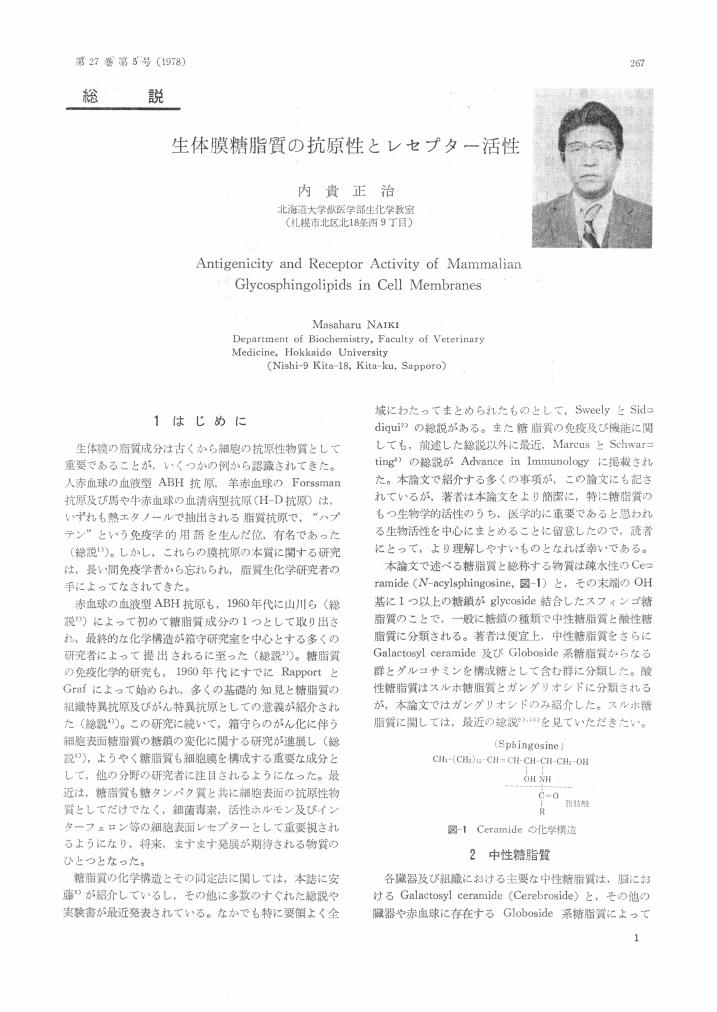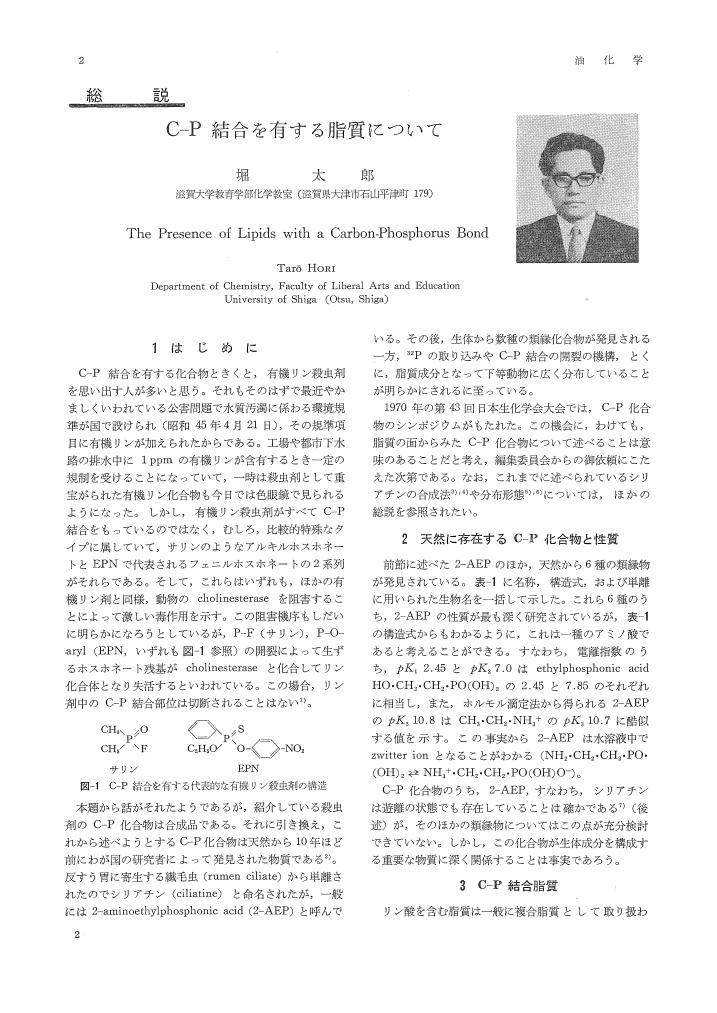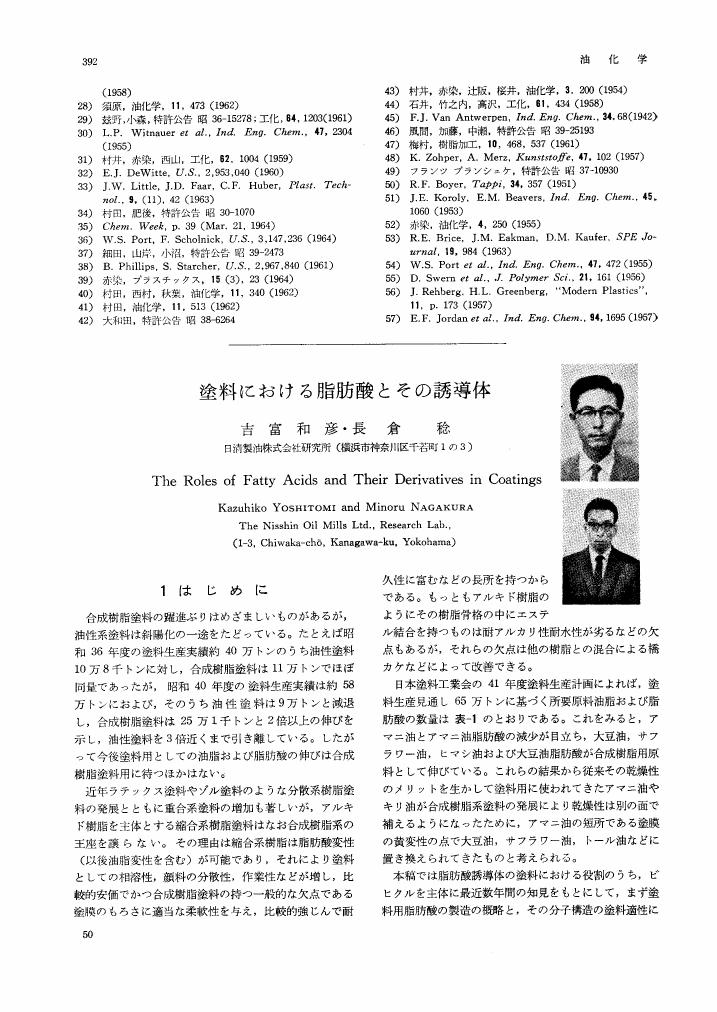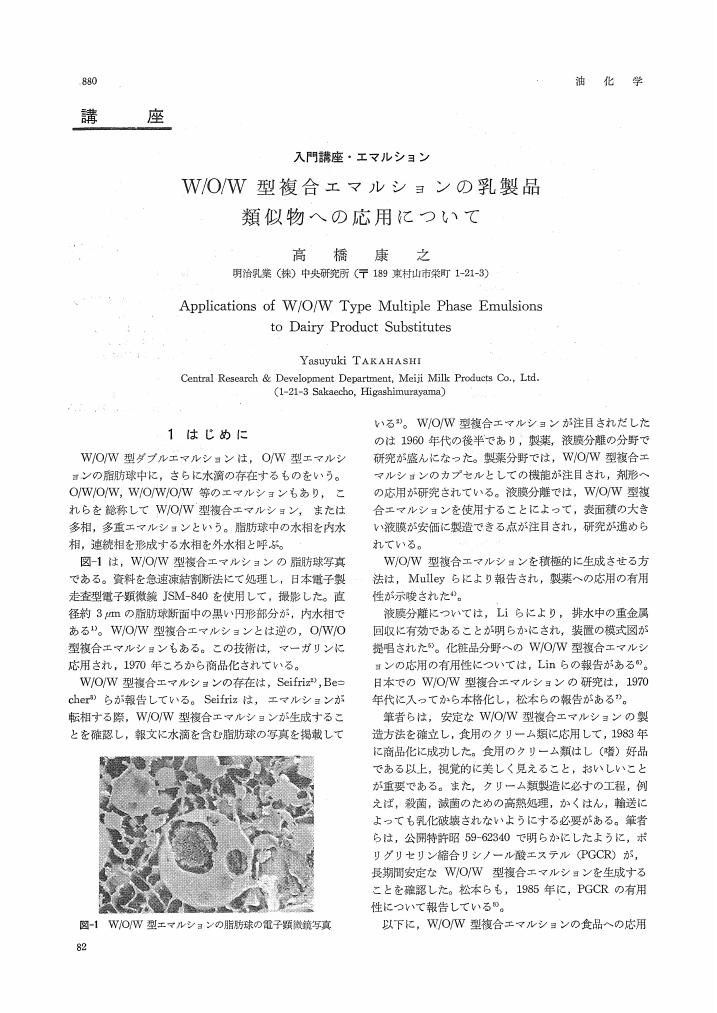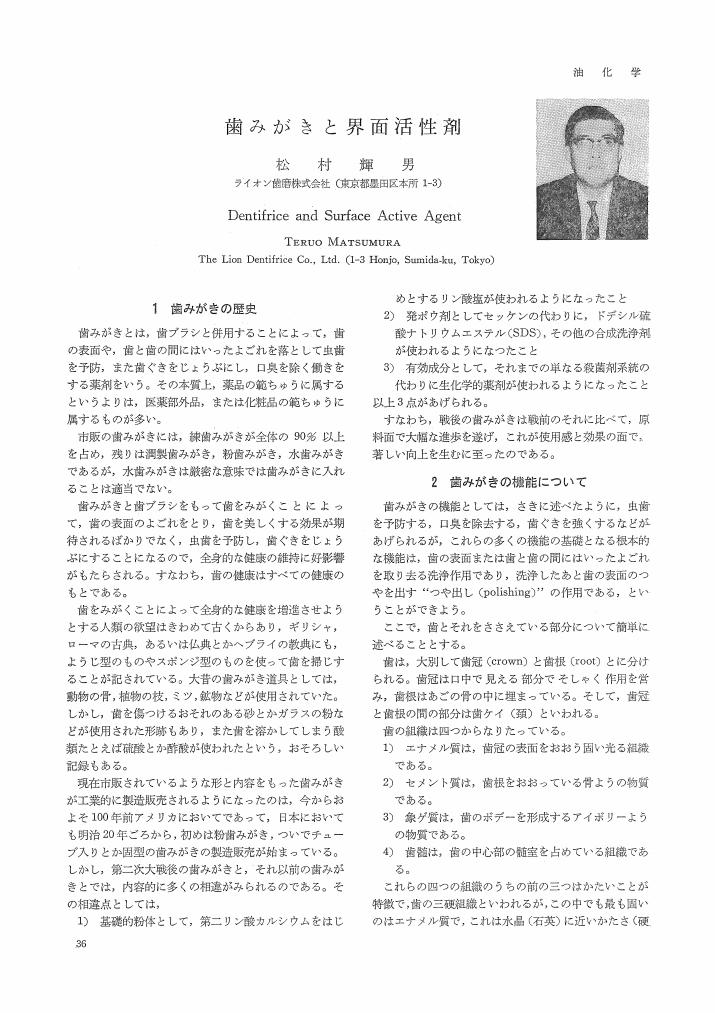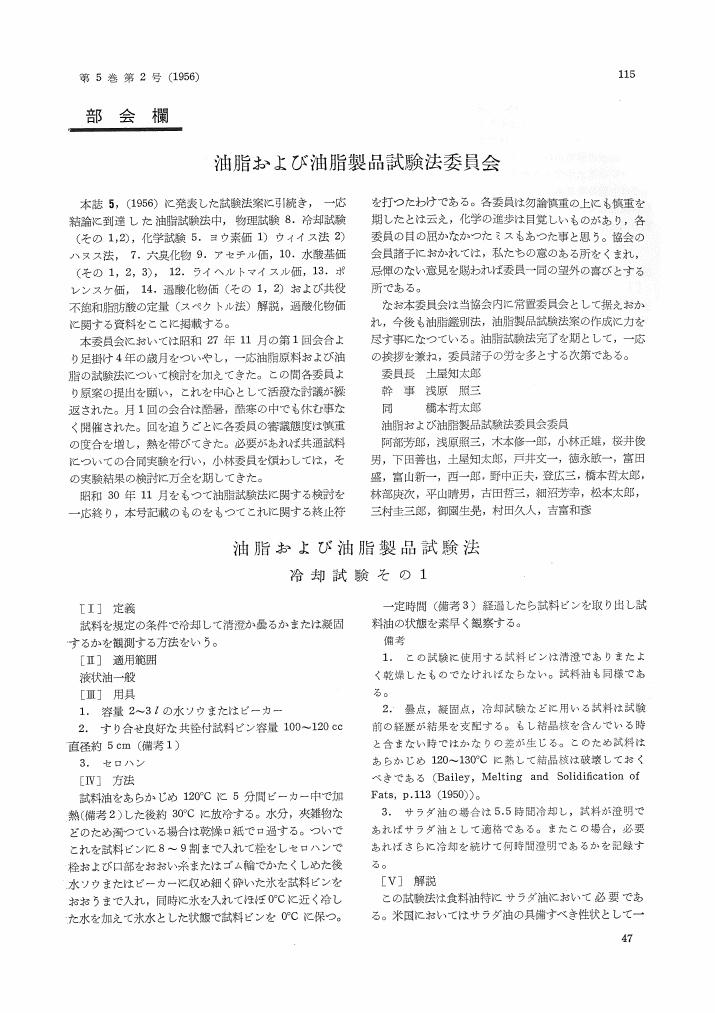1 0 0 0 OA マッコウ鯨油の利用 (第6報*)
- 著者
- 阿部 芳郎 清野 肇 木村 勝紀
- 出版者
- Japan Oil Chemists' Society
- 雑誌
- 油化学 (ISSN:18842003)
- 巻号頁・発行日
- vol.18, no.11, pp.799-804, 1969-11-20 (Released:2009-10-20)
- 参考文献数
- 13
Several works have been reported of the concentration of oleyl oleate from sperm oil. But the oleate oleyl concentrated from sperm oil is so unstable due to the presence of highly unsaturated components that the application of oleyl oleate is limited. It is therefore, necessary to reduce these highly unsaturated components in the oleyl oleate concentrate. The authors attempted to decrease the amounts of polyunsaturated components in sperm body oil by two procedures. The one was to thermally polymerize sperm oil in the presence of active earth, and the other was to hydrogenate the oil selectively with Cu-Cr catalyst under atmospheric pressure. The oleyl oleate was concentrated from thus treated sperm body oils and untreated oil through molecular distillation and fractional crystallization. A.O.M. stabilities of these oleyl oleate concentrates were determined according to the A.O.C.S. analytical method. The oleyl oleate concentrate obtained from thermally polymerized sperm body oil was most stable, while the oleyl oleate from untreated sperm oil was unstable most.
1 0 0 0 OA 界面活性剤集合体のESRスピンプローブ法による研究
- 著者
- 福田 正博
- 出版者
- Japan Oil Chemists' Society
- 雑誌
- 油化学 (ISSN:18842003)
- 巻号頁・発行日
- vol.37, no.11, pp.973-978, 1988-11-20 (Released:2009-11-10)
- 参考文献数
- 26
The behavior of surfactant aggregates in solutions was investigated by an ESR spin probe method. The following informations were obtained from analysis of spectra. 1) Two types of micelles were directly observed in commercially available sodium alkyl poly (oxyethylene) ether sulfate-alkyl poly (oxyethylene) ether mixed surfactant solutions. 2) Sodium dodecyl sulfate molecules (2 mM) incorporated into phospholipid bilayers (13.6 mM) formed clusters by themselves, causing phase separation of the bilayers. 3) Sodium 3- dodecyloxypoly (oxyethylene) -1-propane sulfonates interacted with an ESR spin probe even below the cmc. This was explained by the formation of ESR spin probe-induced micelles. 4) Butyl poly (oxypropylene) ether derivatives having polar dissociative functional groups on their terminal hydroxyl groups behaved in a manner similar to a reversed micelle or a W/O microemulsion system and were inverted to an O/W type through a transparent and viscoelastic gel stage with increasing a water content.
1 0 0 0 OA 生体膜糖脂質の抗原性とレセプター活性
- 著者
- 内貴 正治
- 出版者
- Japan Oil Chemists' Society
- 雑誌
- 油化学 (ISSN:18842003)
- 巻号頁・発行日
- vol.27, no.5, pp.267-276, 1978-05-20 (Released:2009-11-10)
- 参考文献数
- 117
1 0 0 0 OA C-P結合を有する脂質について
- 著者
- 堀 太郎
- 出版者
- Japan Oil Chemists' Society
- 雑誌
- 油化学 (ISSN:18842003)
- 巻号頁・発行日
- vol.20, no.1, pp.2-6, 1971-01-20 (Released:2009-11-10)
- 参考文献数
- 35
- 被引用文献数
- 1
1 0 0 0 OA 脂質の生合成
- 著者
- 藤野 安彦
- 出版者
- Japan Oil Chemists' Society
- 雑誌
- 油化学 (ISSN:18842003)
- 巻号頁・発行日
- vol.20, no.10, pp.627-636, 1971-10-20 (Released:2009-11-10)
- 参考文献数
- 13
1 0 0 0 OA NMR緩和時間測定による界面活性剤溶液の研究
- 著者
- 辻井 薫 常盤 文克
- 出版者
- Japan Oil Chemists' Society
- 雑誌
- 油化学 (ISSN:18842003)
- 巻号頁・発行日
- vol.27, no.1, pp.2-12, 1978-01-20 (Released:2009-11-10)
- 参考文献数
- 55
- 被引用文献数
- 2 1
1 0 0 0 OA 洗剤のビルダーに関する研究 (第1報)
- 著者
- 荻野 圭三 林 信和
- 出版者
- Japan Oil Chemists' Society
- 雑誌
- 油化学 (ISSN:18842003)
- 巻号頁・発行日
- vol.26, no.5, pp.278-282, 1977-05-20 (Released:2009-10-20)
- 参考文献数
- 11
- 被引用文献数
- 2 2
Calcium ion sequestration capacities have been determined for eleven kinds of organic compounds in comparison with sodium tripolyphosphate (STPP) which is known as the most important detergent builder. The organic compounds used in this study were amino carboxylates (EDTA, NTA), hydroxy carboxylates (sodium lactate, tartarate, citrate, gluconate), and dicarboxylates (sodium oxalate, maleate, malonate, succinate, L-aspargmate). The sequestration capacities of these organic compounds depend on the pH of the solution. The most prominent characteristic of sodium citrate was found in the pH 9 region.
1 0 0 0 OA 塗料における脂肪酸とその誘導体
- 著者
- 吉富 和彦 長倉 稔
- 出版者
- Japan Oil Chemists' Society
- 雑誌
- 油化学 (ISSN:18842003)
- 巻号頁・発行日
- vol.15, no.8, pp.392-405, 1966-08-20 (Released:2009-10-20)
- 参考文献数
- 218
1 0 0 0 OA 合成カプサイシン同族体の抗酸化性と辛味
- 著者
- 藤本 健四郎 菅野 安広 金田 尚志
- 出版者
- Japan Oil Chemists' Society
- 雑誌
- 油化学 (ISSN:18842003)
- 巻号頁・発行日
- vol.29, no.6, pp.419-422, 1980-06-20 (Released:2009-11-10)
- 参考文献数
- 15
- 被引用文献数
- 1 3
In the previous paper, the antioxidant effect of capsaicin, the pungent principle of red pepper, has been demonstrated. Capsaicin is a N-vanillylamide whose pungency has been known to depend upon the carbon chain length of the fatty acid moiety. In this paper, to obtain the pungent free N-vanillylamides, which are expected to be useful as antioxidants for foods, syntheses of N-vanillylamides of saturated C12 to C22 fatty acids were carried out, and their pungency and antioxidant activity were determined. As a result, their pungency reduced with the elongation of carbon chain of the fatty acid. That is, compared with C9 amide, the pungency of C14 amide was 1/100 and that of C18 amide decreased to 1/1000. On the other hand, the antioxygenic effect of each synthetic N-vanillylamide on methyl ester of safflower oil was almost equal to that of the natural pungent mixture extracted from red pepper. By addition of 0.02mol/kg of synthetic amides in the substrate, the antioxidant activity was equivalent to that of BHA in 0.02% level. In this level, pungency was not found in the sensory even for C12 amide.
1 0 0 0 OA ICP発光分光分析
- 著者
- 中原 武利
- 出版者
- Japan Oil Chemists' Society
- 雑誌
- 油化学 (ISSN:18842003)
- 巻号頁・発行日
- vol.32, no.10, pp.622-633, 1983-10-20 (Released:2009-11-13)
- 参考文献数
- 96
- 被引用文献数
- 1
1 0 0 0 OA 油脂のにおい成分の単離と同定
- 著者
- 安田 耕作
- 出版者
- 公益社団法人 日本油化学会
- 雑誌
- 油化学 (ISSN:18842003)
- 巻号頁・発行日
- vol.16, no.11, pp.626-633, 1967-11-20 (Released:2010-02-12)
1 0 0 0 OA W/O/W型複合エマルションの乳製品類似物への応用について
- 著者
- 高橋 康之
- 出版者
- Japan Oil Chemists' Society
- 雑誌
- 油化学 (ISSN:18842003)
- 巻号頁・発行日
- vol.35, no.10, pp.880-888, 1986-10-20 (Released:2009-11-10)
- 参考文献数
- 37
- 被引用文献数
- 5 5
1 0 0 0 OA 漂白剤による色素の退色機構 (第1報)
- 著者
- 田村 隆光 久保園 隆康 田村 勝 吉村 晴夫
- 出版者
- Japan Oil Chemists' Society
- 雑誌
- 油化学 (ISSN:18842003)
- 巻号頁・発行日
- vol.44, no.12, pp.1086-1092, 1995-12-20 (Released:2009-10-16)
- 参考文献数
- 21
- 被引用文献数
- 2 1
A pseudo-first-order reaction constants (kobs) of dyes having a single hydroxyl group inthe molecule (Orange I, Orange II) by various bleaching agents were measured as a function ofpH. Used bleaching agents were hydrogen peroxide, peracetic acid, potassium permonosulfate, and sodium hypochlorite. The kobs of each dye showed maximum at intermediate pH betweenan acid dissociation constant of bleaching agent (pKa) and an acid dissociation constant of dye (pKd). Distribution curves of kobs on pH showed symmetrical narrow distribution when the value of pKd was close to pKa, and symmetrical broad distribution when the value of pKd was far apart from pKa. These results were analyzed with reaction kinetics by assumming the ionic reaction among protonated and deprotonated form of the bleaching agents and the dyes. It wasproved that the distribution curves of kobs on pH follow the following equation.kobs= [A] t/ (1+ [H+] /Ka) (1+Kd/ [H+]) where [A] t is the total bleaching agent concentration, k1 is a second-order reaction constant byassuming the reaction between protonated dye ; [DyeH] and deprotonated bleaching agents ; [A-]. The calculated values obtained by above equation were in good agreement with the observed values. Therefore, it was concluded that the decoloration mechanism of the dyes by bleaching agents conforms to the ionic reaction among protonated and deprotonated forms of the bleaching agents and the dyes. We have named this decoloration mechanism as “the mutual ionic reaction mechanism”.
1 0 0 0 OA セッケン洗剤類の世界の生産・消費量統計
- 著者
- 富山 新一
- 出版者
- 公益社団法人 日本油化学会
- 雑誌
- 油化学 (ISSN:18842003)
- 巻号頁・発行日
- vol.17, no.11, pp.642-647, 1968-11-20 (Released:2009-10-20)
- 参考文献数
- 1
1 0 0 0 OA 脂質の抗がん効果
- 著者
- 磯田 好弘 西沢 幸雄 山口 茂彦 平野 二郎 山本 明彦 沼田 光弘
- 出版者
- Japan Oil Chemists' Society
- 雑誌
- 油化学 (ISSN:18842003)
- 巻号頁・発行日
- vol.42, no.11, pp.923-928, 1993-11-20 (Released:2009-10-16)
- 参考文献数
- 16
- 被引用文献数
- 1 1
Various kinds of free fatty acid were examined on their antitumor activity against ascites tumor cells, Survival days of mice after administrations of free fatty acid were observed. From these data I.L.S. (Increase of life-span) was culcurated and used as a parameter of Antitumor activity. Effective fatty acids against Sarcoma-180 were as follows : Pentadecanoic acid in saturated fatty acid series of carbon number 6 to 24, oleic acid in mono-unsaturated fatty acid series, and α-linolenic and docosahexaenoic acids in poly-unsaturated fatty acid series.The most effective fatty acid in our antitumor activity research is (hydroxy phenyl) stearic acid.The mechanism on antitumor activity of free fatty acid is not made clear sufficiently but it was suggested that disorder of membrane caused by fatty acids is responsible for their antitumor effect.
1 0 0 0 OA 酸化マグネシウムによるフライ油の脱酸について
- 著者
- 湯木 悦二
- 出版者
- Japan Oil Chemists' Society
- 雑誌
- 油化学 (ISSN:18842003)
- 巻号頁・発行日
- vol.20, no.5, pp.313-316, 1971-05-20 (Released:2009-11-10)
- 参考文献数
- 10
The effect of the magnesium oxide adsorption on the removal of free fatty acid in the oil which was used for frying, was tested. This method was proposed by Hoovers in U.S. 3, 231, 390.The prevention of the increase of free fatty acid in the oil during deep fat frying is very important. This increase is mainly caused by the hydrolysis of fat and the rate of hydrolysis is proportional to the acid concentration. The effective method to prevent hydrolysis is, therefore, to inactivate the action of free fatty acid as is produced.Using the continuous water-spraying and heating system and the automatic test fryer, the effect of the magnesium oxide adsorption was tested (Table-4, Fig. -2). As a result, the following facts were recognized. The free fatty acid content in the oil has been maintained in low amount at the initial stage. However, the magnesium soap which was produced by the reaction of magnesium oxide with the free fatty acid, dissolved into the oil and accumulated gradually with increase of the frying time, and this soap promoted hydrolysis significantly. Therefore, the higher sensitivity of the oil to hydrolysis resulted in the higher content of free fatty acid as compared with that of the control test, at the latter stage.As mentioned above, this method is not practical.
1 0 0 0 OA 合成セラミドを含む人工細胞間脂質の相挙動とラメラ構造の形成機構
- 著者
- 水島 洋泉 深沢 純一 鈴木 敏幸
- 出版者
- Japan Oil Chemists' Society
- 雑誌
- 油化学 (ISSN:18842003)
- 巻号頁・発行日
- vol.44, no.8, pp.586-592, 1995-08-20 (Released:2009-10-16)
- 参考文献数
- 29
The mechanism for the self-assembly of the lamellar structure of intercellular stratum corneum lipids (SCL) has been a subject of considerable interest. The present study was conducted for clarification of this point using a synthetic pseudo-ceramide (SLE). The phase behavior and the structural characteristics of SLE other major components of SCL, fatty acids, cholesterol and cholesteryl esters, were studied by differential scanning calorimetry (DSC) and X-ray analysis. Stable lamellar structures could be confirmed only in the mixed systems of SLE and long-chain saturated fatty acids (stearic acid and palmitic acid). Lipid mixtures whose saturated fatty acid had been replaced by oleic acid failed to form lamellar structures and crystals of SLE were found present within these mixtures. It thus follows that fatty acids, as well as ceramides are essential to the self organization of SCL and that stable bilayer formation depends considerably on fatty acid molecular structure.
1 0 0 0 OA 歯みがきと界面活性剤
- 著者
- 松村 輝男
- 出版者
- Japan Oil Chemists' Society
- 雑誌
- 油化学 (ISSN:18842003)
- 巻号頁・発行日
- vol.18, no.Supplement, pp.36-40, 1969-11-25 (Released:2009-10-20)
- 参考文献数
- 5
1 0 0 0 OA 油脂および油脂製品試験法
- 出版者
- 公益社団法人 日本油化学会
- 雑誌
- 油化学 (ISSN:18842003)
- 巻号頁・発行日
- vol.5, no.2, pp.115-126, 1956-03-15 (Released:2009-10-09)
1 0 0 0 OA 細胞の脂質過酸化と老化
- 著者
- 別府 正敏 菊川 清見
- 出版者
- Japan Oil Chemists' Society
- 雑誌
- 油化学 (ISSN:18842003)
- 巻号頁・発行日
- vol.44, no.10, pp.738-750, 1995-10-20 (Released:2009-10-16)
- 参考文献数
- 110
- 被引用文献数
- 2 3
Erythrocytes undergo oxidative damage including membrane lipid peroxidation and protein oxidation during the aging process. Naturally occurring IgG autoantibody to band 3 glycoprotein of the erythrocyte membrane (anti band 3) binds to the aged erythrocytes. The IgG binding is a critical event in the removal of aged erythrocytes from the circulation since IgG-bound cells are destined to be phagocytosed by the macrophages in spleens.The selective recognition of the aged cells by the antibody occurs by the following successive mechanisms : 1) lipid peroxidation and/or SH oxidation of proteins in the membrane, 2) clustering of band 3 glycoprotein on the membrane, 3) anti-band 3 binding to the sialyl poly-N-acetyllactosaminyl saccharide chains of the clustered band 3. These events indicate that lipid peroxidation and protein oxidation are closely related to the erythrocyte aging and the mechanism of the aged cell removal from the circulation.
